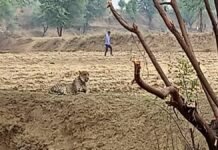
Umaria(M.P): Bandhavgarh tiger reserve. After the death of a three-year-old tigress in a mutual conflict two days ago in Bandhavgarh Tiger Reserve, the question has arisen as to why the maximum number of tigers are dying here in mutual conflict. Four such incidents have taken place in the last five months. This question has also been placed in front of the National Tiger Conservation Authority (NTCA).
Bhopal’s RTI activist Ajay Dubey has raised this question on Twitter, but has not yet received any authorized answer to this question. On the other hand, wildlife experts say that this situation is being created due to the high number of tigers in the forest. In fact, Bandhavgarh has 124 tigers and many cubs. The park is spread over 1530 sq km and has 10 villages in core area and 96 villages in buffer area.

According to experts, for a tiger, at least 15 sq km of territory (own area) is required. In this sense, the park is getting smaller for tigers. The density of tigers in Bandhavgarh is high and now even the cubs will grow up and make their territory. Due to this, tigers are confronted and a situation of conflict is created. Apart from this, big tigers attack cubs to get in touch with tigers and to maintain their dominance.
Grass land management weak
Ajay Dubey says that the grass land management of Bandhavgarh has always been weak. Due to this, tiger fire is more prevalent in tigers. Due to weak grass land management, there is a shortage of vegetarian animals in the forest. If vegetarian animals are not available for food, they start changing the territory. When the tiger reaches the second territory, the possibility of conflict between them doubles. If the management knows the reasons for this, then why are measures not being taken to end the conflict.
Shifting protection
Experts say that for the protection of adult cubs it is necessary that the forests be prepared accordingly. For this, it is necessary that shifting of tigers to forests where the density of tigers is low. Version – Bandhavgarh has more adult cubs. When new tigers come out to make their territory, this kind of struggle happens. – Vincent Rahim, Field Director, Bandhavgarh Tiger Reserve, Umaria, MP



















































